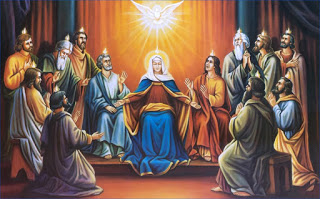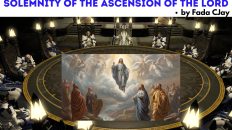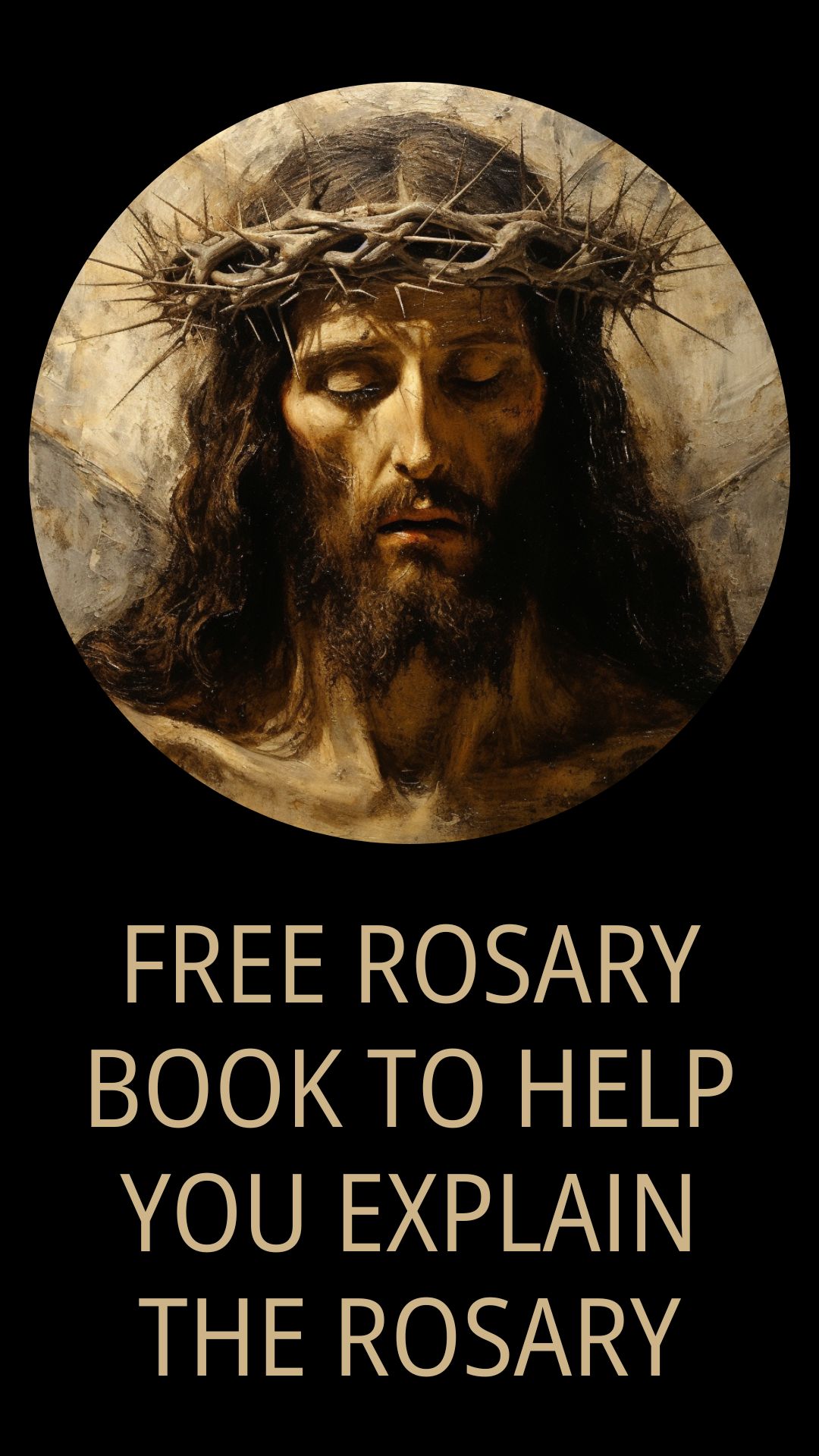A REFLECTION FOR PENTECOST
SUNDAY
SUNDAY
They were all together in one place – unmotivated
and fearful – when suddenly the tide of Holy Spirit rolled in.
and fearful – when suddenly the tide of Holy Spirit rolled in.
The feast of Pentecost which we celebrate today has its roots
from Judaism. Along with the Feast of the Passover and the Feast of
Tabernacles, Pentecost was one of the major feasts of the Jews. During
these three great Jewish festivals, every male Jew living within twenty miles
of Jerusalem was legally bound to go to Jerusalem to participate in
the feast.
from Judaism. Along with the Feast of the Passover and the Feast of
Tabernacles, Pentecost was one of the major feasts of the Jews. During
these three great Jewish festivals, every male Jew living within twenty miles
of Jerusalem was legally bound to go to Jerusalem to participate in
the feast.
It is pertinent to note that the word Pentecost stems from
the Greek “Pentecostes” which means “fiftieth.” This is because it was
celebrated fifty days after the Feast of the Passover. The Jews
added to the Feast of Pentecost the element of Yahweh’s covenant with Noah,
which was made fifty days after the great deluge, and also, this feast
became an occasion to thank God for His covenant made on Sinai with Moses,
which occurred fifty days after the beginning of the Exodus from Egypt.
the Greek “Pentecostes” which means “fiftieth.” This is because it was
celebrated fifty days after the Feast of the Passover. The Jews
added to the Feast of Pentecost the element of Yahweh’s covenant with Noah,
which was made fifty days after the great deluge, and also, this feast
became an occasion to thank God for His covenant made on Sinai with Moses,
which occurred fifty days after the beginning of the Exodus from Egypt.
In the Christian parlance, Pentecost marks the end and the goal of the
Easter season. For us Christians, it is a memorial of the descent of the
Holy Spirit upon the apostles and the Virgin Mary in the form of tongues, an
event that took place fifty days after the resurrection of Jesus. Thus,
the Paschal mystery of the Passion, the Death, the Resurrection, and the
Ascension of Jesus is completed in the sending of the Holy Spirit by the Father
at the request of the Son upon his disciples. Little wonder, the Church marks
the end of the Eastertide with this feast. The feast also commemorates the
official birthday of the Christian Church. This we see in St. Peter’s apostolic
preaching, which resulted in the conversion of 3000 Jews to the
Christian faith that very day.
Easter season. For us Christians, it is a memorial of the descent of the
Holy Spirit upon the apostles and the Virgin Mary in the form of tongues, an
event that took place fifty days after the resurrection of Jesus. Thus,
the Paschal mystery of the Passion, the Death, the Resurrection, and the
Ascension of Jesus is completed in the sending of the Holy Spirit by the Father
at the request of the Son upon his disciples. Little wonder, the Church marks
the end of the Eastertide with this feast. The feast also commemorates the
official birthday of the Christian Church. This we see in St. Peter’s apostolic
preaching, which resulted in the conversion of 3000 Jews to the
Christian faith that very day.
Today’s Scripture readings remind us that Pentecost is an
event of both the past and the present. The main theme of today’s
readings encourages us to share the gift of the Holy Spirit with others. Put
differently, the gift of the Holy Spirit moves its recipients to action and
inspires them to share this gift with others.
event of both the past and the present. The main theme of today’s
readings encourages us to share the gift of the Holy Spirit with others. Put
differently, the gift of the Holy Spirit moves its recipients to action and
inspires them to share this gift with others.
The first reading, from the Acts of the Apostles (Acts 2:1-11), describes in
detail the transformation that took place in the lives of the followers of
Christ in the upper room. There was first “a noise like a strong,
driving wind.” Then there were “tongues as of fire” resting on the
disciples, and each of them was filled with the Holy Spirit. The miracle
of tongues on Pentecost thus reverses the confusion of tongues wrought by God
at the Tower of Babel, as described in Genesis 11. Thus, this feast commemorates
the official birthday of the Christian Church. This we see in St. Peter’s
apostolic preaching, which resulted in the conversion of 3000 Jews to the
Christian faith that very day.
detail the transformation that took place in the lives of the followers of
Christ in the upper room. There was first “a noise like a strong,
driving wind.” Then there were “tongues as of fire” resting on the
disciples, and each of them was filled with the Holy Spirit. The miracle
of tongues on Pentecost thus reverses the confusion of tongues wrought by God
at the Tower of Babel, as described in Genesis 11. Thus, this feast commemorates
the official birthday of the Christian Church. This we see in St. Peter’s
apostolic preaching, which resulted in the conversion of 3000 Jews to the
Christian faith that very day.
Consequently, we see how Paul explains in the second reading (I Cor 12:3-7, 12-13), the sharing of the various
spiritual gifts of the Holy Spirit which enriches the Church. He refers
to the varieties of gifts given to the Church as coming from the same Spirit
who activates all of them in Christians for the common good. They are
described as the gifts, fruits and charisms of the Spirit from the dimension of
prophecy, teaching, administration, acts of charity, healing and speaking in
tongues, residing in different persons like Apostles, prophets, teachers,
healers and so on. Paul lists the fruits of the Spirit in his Letter to
the Galatians “What the Spirit brings is … love, joy, peace, patience,
kindness, goodness, faithfulness, gentleness and self-control” (5:22). He
continues, “Since the Spirit is our life, let us be directed by the Spirit”
(5:25). Paul insists that these spiritual gifts are to be used in the
present time for the benefit of others, for the common good and for the
building up of the body of Christ.
spiritual gifts of the Holy Spirit which enriches the Church. He refers
to the varieties of gifts given to the Church as coming from the same Spirit
who activates all of them in Christians for the common good. They are
described as the gifts, fruits and charisms of the Spirit from the dimension of
prophecy, teaching, administration, acts of charity, healing and speaking in
tongues, residing in different persons like Apostles, prophets, teachers,
healers and so on. Paul lists the fruits of the Spirit in his Letter to
the Galatians “What the Spirit brings is … love, joy, peace, patience,
kindness, goodness, faithfulness, gentleness and self-control” (5:22). He
continues, “Since the Spirit is our life, let us be directed by the Spirit”
(5:25). Paul insists that these spiritual gifts are to be used in the
present time for the benefit of others, for the common good and for the
building up of the body of Christ.
Within the Context of the outpour of the Holy Spirit; today’s Gospel (Jn 20: 9-23 ) relates how the risen Jesus gave his Apostles a foretaste of
Pentecost on the evening of Easter Sunday by appearing to them and
entrusting to them the continuance of the mission given him by his heavenly
Father. He then empowered them to do so by breathing upon them and
saying, “Receive the Holy Spirit.” Christian Pentecost explains the fulfillment
of Jesus’ promise to send the Advocate (Paraclete). The gift of the Spirit
would also enable them to fulfill Jesus’ commission to preach the gospel to all
nations. Today’s gospel passage tells us how Jesus gave to the Apostles
the power and authority to forgive sins. “Receive the Holy Spirit.
For those whose sins you forgive, they are forgiven; for those whose sins you
retain, they are retained.” These wonderful words which bind together inseparably
the presence of the Holy Spirit and the gift of forgiveness are referred
to directly in the Sacrament of Reconciliation (Penance). But they have a
much wider meaning. Those words indicate the responsibility we are all
given of being the agents of forgiveness in the world today.
Pentecost on the evening of Easter Sunday by appearing to them and
entrusting to them the continuance of the mission given him by his heavenly
Father. He then empowered them to do so by breathing upon them and
saying, “Receive the Holy Spirit.” Christian Pentecost explains the fulfillment
of Jesus’ promise to send the Advocate (Paraclete). The gift of the Spirit
would also enable them to fulfill Jesus’ commission to preach the gospel to all
nations. Today’s gospel passage tells us how Jesus gave to the Apostles
the power and authority to forgive sins. “Receive the Holy Spirit.
For those whose sins you forgive, they are forgiven; for those whose sins you
retain, they are retained.” These wonderful words which bind together inseparably
the presence of the Holy Spirit and the gift of forgiveness are referred
to directly in the Sacrament of Reconciliation (Penance). But they have a
much wider meaning. Those words indicate the responsibility we are all
given of being the agents of forgiveness in the world today.
We come to know Jesus through the Sacramental Mysteries of
the Church, and Holy Spirit is at the heart of the sacramental life of the Church.
Baptism, Confirmation and Holy Orders are the Sacramental Mysteries through
which people receive the seal of the Holy Spirit. It would be impossible
for us to receive Jesus in the Eucharist without the descent of the Holy Spirit
at the Epiclesis of the Divine Liturgy. Even the forgiveness of sins
comes through the Holy Spirit (John 20:21-23). The Holy Spirit both
confirmed the Apostles in Holy Orders as priests and empowered them to forgive
sins by His power, a work which He continues today in each of our priests.
the Church, and Holy Spirit is at the heart of the sacramental life of the Church.
Baptism, Confirmation and Holy Orders are the Sacramental Mysteries through
which people receive the seal of the Holy Spirit. It would be impossible
for us to receive Jesus in the Eucharist without the descent of the Holy Spirit
at the Epiclesis of the Divine Liturgy. Even the forgiveness of sins
comes through the Holy Spirit (John 20:21-23). The Holy Spirit both
confirmed the Apostles in Holy Orders as priests and empowered them to forgive
sins by His power, a work which He continues today in each of our priests.
The feast of the Pentecost offers us the opportunity to look
at the role which forgiveness should play in our dealings with
others. Thus, we are challenged to examine our sense of compassion, our
patience, tolerance and magnanimity. Learning to forgive is a
lifelong task, but the Holy Spirit is with us to make us agents of
forgiveness. If we are prepared on this day of Pentecost to receive the
Holy Spirit into our lives, we can have confidence that
our lives will be marked by the Spirit of forgiveness.
at the role which forgiveness should play in our dealings with
others. Thus, we are challenged to examine our sense of compassion, our
patience, tolerance and magnanimity. Learning to forgive is a
lifelong task, but the Holy Spirit is with us to make us agents of
forgiveness. If we are prepared on this day of Pentecost to receive the
Holy Spirit into our lives, we can have confidence that
our lives will be marked by the Spirit of forgiveness.
Dear friends, Pentecost is not just one day, but every day. Without
breath, there is no life. Without the Spirit, the Church is a field
of dry, dead bones. Fulton J. Sheen once said about the Church,
“Even though we are God’s chosen people, we often behave more like God’s
frozen people–frozen in our prayer life, frozen in the way we relate with one
another, frozen in the way we celebrate our faith.” Thus, we
continue to remain frozen if we do not invite the Holy Spirit into our lives to
rekindle in us the spirit of new life and enthusiasm, the fire of God’s
love. Hence, we all need the daily anointing of the Holy Spirit to keep
us steadfast in our Christian faith. Let us imitate the psalmist who in psalm
51 asked God to create in him a New Life and take not His Holy Spirit from him.
This we see in different dimension in today’s Responsorial psalm (PS 104:1, 24, 29-30, 31, 34): “Lord, send forth your Spirit, and renew the
face of the earth”.
We all need to be
renewed in God’s saving Spirit and consequently be agents of renovations in the
lives of our brothers and sisters out there in the society at large by our Corporal
and Spiritual works of Mercy characterized in LOVE. We pray that the Holy
Spirit would grant us the grace to achieve this. Amen.
renewed in God’s saving Spirit and consequently be agents of renovations in the
lives of our brothers and sisters out there in the society at large by our Corporal
and Spiritual works of Mercy characterized in LOVE. We pray that the Holy
Spirit would grant us the grace to achieve this. Amen.
Happy feast-day to
you all!!!
you all!!!
End of Eastertide




